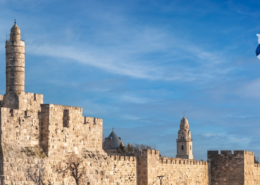Finding the Remnant: Romans 11
Few passages in the Bible motivate Jewish evangelism more than the apostle Paul’s words in Romans 11:25–29: For I do not want you, brethren, to be uninformed of this mystery—so that you will not be wise in your own estimation—that a partial hardening has happened to Israel until the fullness of the Gentiles has come in; and so all Israel will be saved; just as it is written, “The Deliverer will come from Zion, He will remove ungodliness from Jacob. This is My covenant with them, when I take away their sins.”
From the standpoint of the gospel they are enemies for your sake, but from the standpoint of God’s choice they are beloved for the sake of the fathers; for the gifts and the calling of God are irrevocable. These verses serve as a crescendo for one of Paul’s main themes in Romans: the faithfulness of God to both Jew and Gentile (Rom 3:3–4, 5:8, 8:28–30). Because of God’s commitment to the Jewish people, we can have confidence and hope as we share the gospel message of forgiveness through Messiah.
We can see that God has not rejected the Jewish people despite Paul’s acknowledgment that the Jewish people largely forsook the gospel (Rom 11:28). In God’s providence, they became enemies of the gospel for the salvation of the Gentiles (Rom 11:11–12). On the other hand, Paul wrote that Israel is both an enemy of the gospel and beloved, separated from the New Covenant of salvation but still chosen according to the covenants made with Abraham, Isaac, and Jacob.
God remains in covenant with them, despite their unbelief in Messiah, “for the gifts and the calling of God are irrevocable” (Rom 11:29). The people’s disbelief has not altered God’s promises for His estranged but chosen people. Paul calls this situation a “mystery” that he wants his Gentile readers to understand (Rom 11:25). Usually, unbelief means separating oneself from relationship with God, but in the case of Israel, God promised never to separate Himself from His promises to Israel.
Therefore, their unbelief is only a “partial hardening.” Furthermore, Paul had already identified himself as a Jew who believes in Jesus (Rom 11:1), reminding his readers that God still saves Jewish people through the gospel. Just as Paul is part of the remnant, there are also other Jews awaiting the proclamation of the gospel. Because Israel’s hardening is only partial, we can take heart that some will believe when we proclaim the gospel to them.
Even so, the glorious mystery deepens further. We should be encouraged that God has remained faithful to His people Israel, and He is still saving a Jewish remnant from their sins. But Paul, based on the Hebrew prophets, knew that the remnant of Jewish believers in Jesus would expand to the entire nation one day! After “the fullness of the Gentiles has come in,” the people of Israel will experience an outpouring of grace unlike ever before, “and so all Israel will be saved” (Rom 11:26; Isaiah 59:20; Zechariah 12:10–13:1).
In the meantime, before Messiah returns, we can take heart that every generation in Israel’s history—including today—contains “a remnant according to God’s gracious choice” (Rom 11:5). It is time to share the gospel with the Jewish people and find that remnant.
A Ministry of Proclamation: Isaiah 62
In the latter chapters of the book of Isaiah, the prophet paints a beautiful picture of God’s kingdom and the events and circumstances leading up to its final establishment in Zion. The Lord Himself will restore and glorify the once
wayward and trampled nation. Israel’s Savior will heal, lift up, and exalt those once afflicted and downtrodden. The One who keeps Israel will stifle the nations that once attacked and oppressed God’s people.
Amid such prophetic promises and descriptions, Isaiah mentions the unique role God’s faithful followers play in unfolding His divine plan. Their refusal to stay silent will characterize the ministry of these followers. They will speak up! “For Zion’s sake I will not keep silent, and for Jerusalem’s sake I will not keep quiet” (Isa 62:1a).
Theirs will be a ministry of proclamation and intercession, specifically the declaration of the “good news” (Isa 61:1) that Israel’s Savior is coming to her and that “His reward is with Him, and His recompense before Him” (Isa 62:11b). God’s faithful will also continuously remind God in prayer of His commitment to make Jerusalem a praise in the earth.
The Scriptures call believers today to proclaim the good news to Israel. We also find some helpful instructions in Isaiah 62 about another component of our calling: the need to pray for Israel’s restoration and salvation. Isaiah 62:6–7
states, “On your walls, O Jerusalem, I have appointed watchmen; all day and all night they will never keep silent. You who remind the Lord, take no rest for yourselves; and give Him no rest until He establishes and makes Jerusalem a praise in the earth” (emphasis added).
This passage describes a sentry who faithfully and ceaselessly approaches the Lord—to the point of annoying Him—to remind Him of the promises He
made concerning Israel! Like the woman from Jesus’ parable in Luke 18:1–8 who incessantly appealed to the judge for justice, Isaiah helps us see the impact of our prayers on God to fulfill His promises to Israel.
Where will their proclamation and intercessory prayers lead, and when will they be complete? When God restores and saves Israel! “Until her righteousness goes forth like brightness, and her salvation like a torch that is burning” (Isa 62:1b). The proclamation of this good news finds its fullness and completion only when Israel accepts her Messiah by faith and finds rest in His kingdom under His rule and authority.
We see this pattern in the New Testament as well. Paul spends a great deal of time in Romans 9–11 explaining God’s ongoing plan for Israel:
• The nation rejected the King the first time He came (Rom 9:1–3, 10:1–2).
• Despite their rejection of Him, God’s promises to them are still in effect (Rom 9:4–6, 11:1).
• The proclamation of the gospel to Israel is necessary and can lead them to salvation (Rom 10:8–17, 11:11).
• In the end, Israel’s acceptance of Jesus will yield new life, restoration, and resurrection for the nation (Rom 11:12–15, 25–27), just as Isaiah describes.
Jesus also connects the ongoing proclamation of the gospel to the Jewish people with His second coming, asserting that the ministry to Israel will not be complete until He returns. “But whenever they persecute you in one city, flee to the next; for truly I say to you, you will not finish going through the cities of Israel until the Son of Man comes” (Matthew 10:23).
In these days and always, we have a ministry of proclamation and intercession—proclaiming the good news to Israel and pleading with the Lord through prayer for Israel’s salvation.
The Restoration of Israel: Zechariah 12:10
The prophet Zechariah told a rebellious Israel that there would come a time when they would finally turn back to the Lord. In Zechariah 12:1, the prophet said, “Thus declares the Lord,” clearly showing that God Himself is speaking. He described a day when Jerusalem and all the house of Judah would be attacked, and when all the world’s nations will stand against Israel and the Jewish people (Zech 12:3). During these dire circumstances, however, the Lord Himself will come and fight on Israel’s behalf.
As believers, we are waiting for the establishment of the throne of David in Jerusalem. This throne represents the rule of Messiah Jesus, the ultimate and eternal Davidic king. The events described by Zechariah will lead to the restoration of the house of David, which Zechariah describes as being “like God, like the angel of the Lord before them” (Zech 12:8). This prophecy makes perfect sense, as Jesus will have returned to rule!
At that time, a great transformation will happen among the Jewish people. God said, “I will pour out on the house of David and on the inhabitants of Jerusalem, the Spirit of grace and of supplication, so that they will look on Me whom they have pierced; and they will mourn for Him, as one mourns for an only son, and they will weep bitterly over Him like the bitter weeping over a firstborn” (Zech 12:10).
In that moment, Israel as a whole will realize that the one whom they had rejected for millennia was everything He said He was in the Bible: the Son of David, the Son of God, the promised Messiah of Israel. It may well have been this moment that Paul envisioned when he wrote the words, “And so all Israel will be
saved” (Romans 11:26).
Israel’s recognition of the Messiah is both heartwarming and heartbreaking. God’s chosen people finally seeing the Light is nothing less than life from the dead (Romans 11:15)! Yet the tone of Zechariah’s words is one of utter grief and mourning. How sad that our people took so long to see what God has been trying to show them from the beginning: “Salvation is from the Lord” (Jonah 2:9)! The best news is that we do not have to wait for that day to see the Jewish people come to faith!
Neither Paul’s prophetic claim that, one day, all Israel will be saved nor Zechariah’s description of that day clearly state that every Jewish person who ever lived will somehow attain salvation. Rather, these prophecies may refer to all those Jewish people who are alive at the time of His return receiving that “Spirit of grace and supplication” to see the truth of Messiah (Zech 12:10).
That means that Jewish people alive today who will not get to see that “great and terrible day” (Malachi 4:5) will need to decide for Messiah beforehand. That is where we can make a difference. We do not know when the day Zechariah describes will arrive. As a result, we must act today to share the Jewish Messiah with God’s chosen people, and not wait.
We know that every day brings us closer to His return. Until the prophecy of Zechariah 12:10 comes to pass, we must look for and work toward a present fulfillment of God’s words to Isaiah—that the Jewish people “might see with their eyes, hear with their ears, understand with their hearts, and return and be healed” (Isa 6:10).






